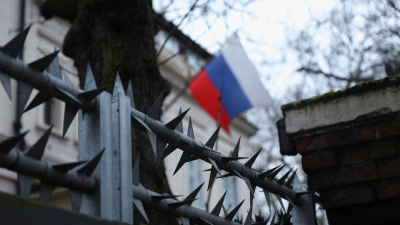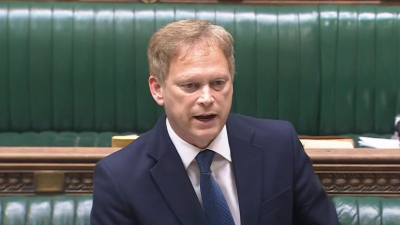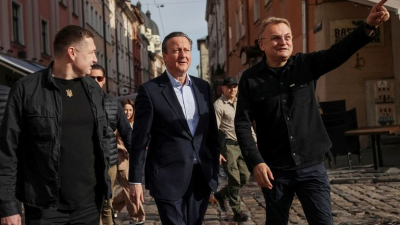UK's Commitment Strengthened: New Envoy to Oversee Weaponry Surge as National Priority Declared
In a pivotal announcement, the UK's Foreign Secretary revealed plans to appoint a dedicated envoy to spearhead a strategic initiative aimed at intensifying the production of weapons and ammunition, marking it as a "national priority". Lord Cameron, while on an official visit to Ukraine, emphasized the critical significance of bolstering support for Ukraine's defense efforts against Russia. He cautioned that the global landscape stood at an "absolutely critical tipping point", emphasizing the imperative for Kyiv's success to avert a perilous future for Europe.
Lord Cameron expressed reservations regarding a proposal by French President Emmanuel Macron advocating for potential NATO troop deployment to Ukraine in the event of a breakthrough by Russian forces. Labeling such a move as a "dangerous escalation", the foreign secretary underscored the potential ramifications, stating, "I don't think it is right to have NATO soldiers killing Russian soldiers.
During his visit, Lord Cameron reaffirmed the UK's unwavering commitment to Ukraine, including pledges to augment transfers of British military stockpiles, encompassing precision-guided munitions and air defense systems. Moreover, the UK has committed to providing at least £3 billion in annual military assistance. However, despite these efforts, Western nations are struggling to match the pace of Russian rearmament, evidenced by recent territorial advancements by Russian forces in the east.
President Putin's decision to escalate hostilities in February 2022 galvanized his nation's economy for war—a stance NATO allies are gradually aligning with. Chancellor Rishi Sunak recently announced plans to increase UK defense spending to 2.5% of national income by 2030, equating to an additional £75 billion in investment. He emphasized the imperative of placing the UK's defense industry on a "war footing" and allocated £10 billion towards domestic munitions production over the next decade.
As geopolitical tensions continue to escalate, the UK's steadfast commitment to fortifying Ukraine's defense capabilities underscores its dedication to regional stability and security.
Lord Cameron outlined a strategic approach to compel defense giants like BAE Systems, Thales, and Babcock to escalate production, despite their accountability to shareholders rather than the government. Revealing plans for a new defense envoy, he emphasized the significance of a dedicated munitions strategy, allocating £10 billion to ramp up production.
This is a national priority," Lord Cameron asserted, underscoring the necessity of bolstering both Ukraine's arsenal and domestic stockpiles. He envisaged the envoy, empowered by the Prime Minister, to negotiate multi-year contracts with defense suppliers, akin to Lord Beaverbrook's role in expanding aircraft production during World War II. However, he clarified that the envoy's approach would align with the demands of the 21st century.
Lord Cameron highlighted the envoy's pivotal role in driving down costs through strategic contracting, ensuring a sustained supply of crucial weaponry such as ammunition, artillery, and missiles. The envoy's direct link to the Prime Minister, he argued, would prioritize this initiative effectively.
Regarding Ukraine's conflict, Lord Cameron delineated two potential outcomes for Europe: one where Ukrainian forces, aided by Western armaments, repel Russian incursions and secure a "just peace." This underscores the urgency of fortifying Ukraine's defense and highlights the pivotal role of the UK's strategic initiatives in shaping the region's future.
Lord Cameron painted a contrasting picture of potential futures, emphasizing the pivotal role of Ukraine's resilience in shaping regional stability. "A future where Ukraine prevails promises security and prosperity for both us and Europe," he remarked optimistically. However, he cautioned against the perilous implications of a scenario where Putin's ambitions succeed, leading to Ukraine's retreat—an outcome he deemed "very dangerous.
Lord Cameron underscored the ripple effects of such a setback, expressing concerns for neighboring nations like Moldova and the Baltic NATO states, apprehensive of potential Russian encroachments. Moreover, he highlighted the broader geopolitical ramifications, with authoritarian regimes in Iran and China closely monitoring developments.
We stand at an absolutely crucial tipping point in global affairs," Lord Cameron concluded, emphasizing the urgency of fortifying Ukraine's defenses to safeguard regional stability and avert potential escalation with far-reaching consequences.
Lord Cameron painted a contrasting picture of potential futures, emphasizing the pivotal role of Ukraine's resilience in shaping regional stability. "A future where Ukraine prevails promises security and prosperity for both us and Europe," he remarked optimistically. However, he cautioned against the perilous implications of a scenario where Putin's ambitions succeed, leading to Ukraine's retreat—an outcome he deemed "very dangerous.
Lord Cameron underscored the ripple effects of such a setback, expressing concerns for neighboring nations like Moldova and the Baltic NATO states, apprehensive of potential Russian encroachments. Moreover, he highlighted the broader geopolitical ramifications, with authoritarian regimes in Iran and China closely monitoring developments.
We stand at an absolutely crucial tipping point in global affairs," Lord Cameron concluded, emphasizing the urgency of fortifying Ukraine's defenses to safeguard regional stability and avert potential escalation with far-reaching consequences.







